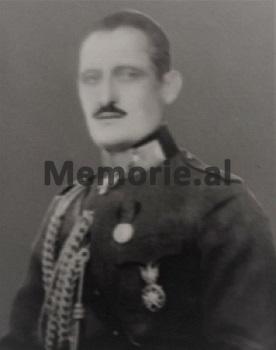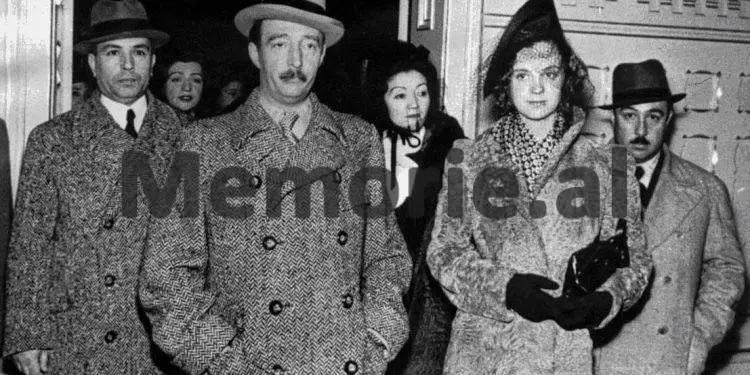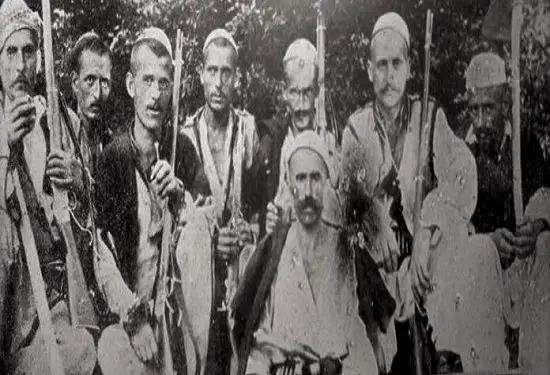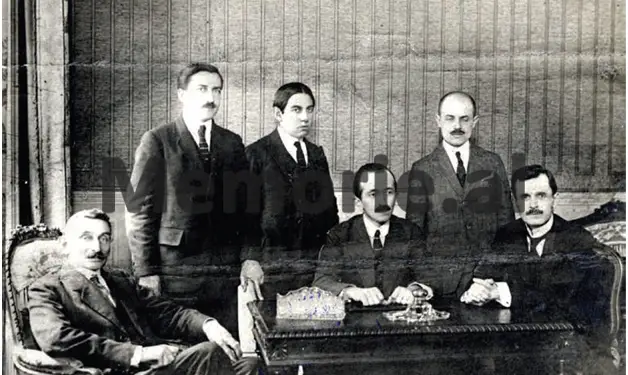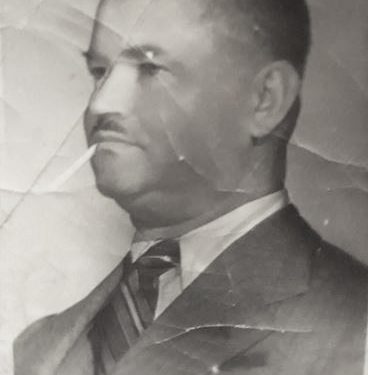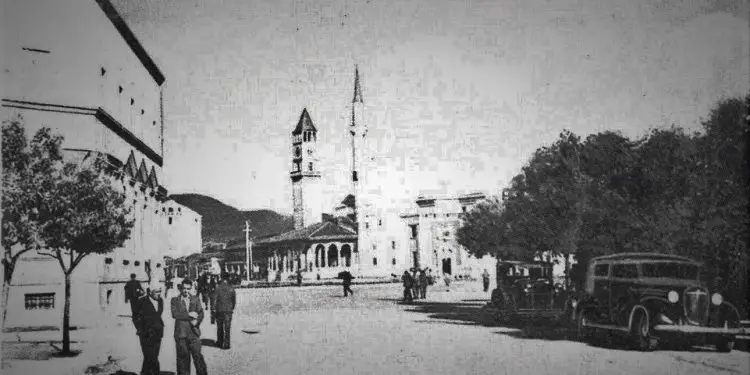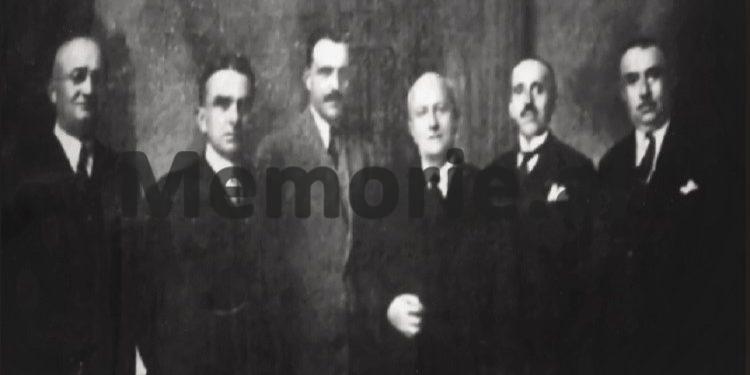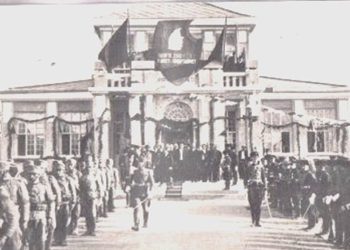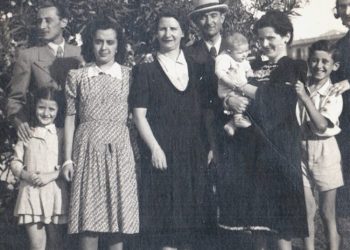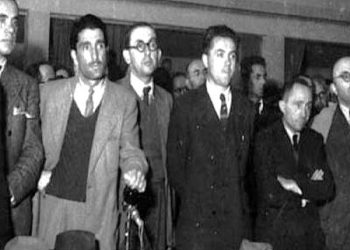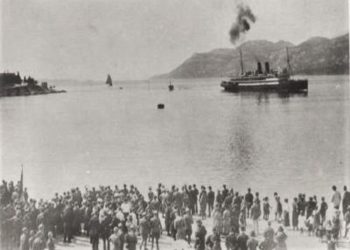By Hysen Selmani
The ninth part
Memorie.al/ European and American press have often addressed the subject of the memories of the Albanian King, Zogu i-r, which he wrote and dictated during his exile from Albania. Considering the notes and syntheses that his assistant, Colonel Hysen Selmani, compiled over the years in his service, – always, next to the King of the Albanians, both at home and in exile, these notes, more or less with parts of detached, without strictly following the usual criteria of memoirs, and without having the definite, final form of an edition, they are prepared by Hysen Selmani himself, who has dedicated most of his life, as in Albania, as well as during the exile, serving the First Zog, the King of the Albanians.
Tirana on April 5, 1939 at 1 p.m
Zogu I, King of the Albanians, ordered the general parliamentary meeting, Parliament and Government together, to study and put the Italian ultimatum to a vote. He was obviously rejected. The National Assembly met at 2 o’clock in the afternoon of this date and examined in detail the Italian ultimatum. It was seen that it is incompatible and violates the independence of Albania, as a free state. Therefore, this institution unanimously decided that it is unacceptable and if it is for war, we will die for the Motherland and for our freedom. He was voted down by everyone. The National Assembly, in this meeting, gave its vote of confidence to His Majesty Zog I. This belief is powerful inside and outside Albania, to protect the rights of the Motherland.
The historic assembly of April 5, 1939, which unanimously decided not to accept the Italian ultimatum and which accepted a more difficult situation that could even lead to war, the Royal Government of Albania, under the chairmanship of Prime Minister Koço Kotta, wearing the newly granted powers, took the unanimous vote of confidence by the Parliament, and based on the decision taken by the National Assembly, compiled the note responsible for the Italian ultimatum. “Recognizing the most critical situation that could arise from Mussolini’s misplaced demand, the ultimatum was categorically rejected.” The Albanian Royal Government, after rejecting the Italian ultimatum, sent a telegraphic protest against Italy, the States of Europe, the USA, the League of Nations, the Balkan states, and the whole world, above all on the fascist military actions, against Albania, which was an ally of the League of Nations.
The composition of the newly elected Albanian Government was: Prime Minister and Minister of Foreign Affairs, Koço Kotta, Minister of Foreign Affairs, Ekrem Libohova, Minister of Justice, Faik Shatku, Minister of the Interior, Musa Juka, Minister of Finance, Kolë Thaçi , Minister of Education, Abdurrahman Dibra, Minister of Agriculture, Rrok Gera. This cabinet, Kotta’s in 1939, along with most of the Parliament, after the invasion, went into exile. This government continued during the Second World War in Istanbul, Turkey, where it was officially recognized by this country and until the end of the War in Istanbul, it was not absent from its services, as will be explained later.
Tirana on April 5, 1939 at 5 pm
On April 5, 1939, at 5 p.m., all the Italian organizers were ordered to immediately return to Italy. But since the Albanian military students were in Italy, this tasked the Minister of Foreign Affairs, Ekrem Libohova, and the commander of the National Defense, General Xhemal Aranitas, not to allow the Italian organizers to go without taking measures, so that our officers who were in Italy, to return to Albania and take measures to leave as soon as possible. At 6 o’clock in the morning of the same date, the US minister Hugh Grant arrived, and immediately the King received him in audience. Where the great friend of Albania, Grant, did what was possible for the “United States of America” to intervene to stop this danger, which was being woven for little Albania and which was not supported by anyone” .
I had received orders to visit the troops in Shijak and Durrës. I took with me Major Gjon Dvorani and Captain Gjergj Moskon, commander of the 75/27 battery, which was to be deployed in the Durrës area. There I went to the Garrison Command, after finishing all the checks, I asked for Prefect Mark Kodheli, but they told me that he had gone to Tirana. After ascertaining what I was ordered to do, I returned to Tirana and straight to the Gendarmerie Command. There I also found Major Abaz Kupin and I told him that I looked for him in Durrës, and it was good that I met him there: “You are in charge as the Commander of the Defense of Durrës and, among the assigned troops, do you have any flaws that are filled immediately”?!
He answered me that: “I have no other power, apart from the 60 gendarmes. Neither was it given to me, nor do I have any orders.” This surprised me. I answered you: “But the Gendarmerie Battalion, under the command of Captain Xhemal Herri, has not yet arrived in Durrës”?! “I have no idea”, Abaz Kupi told me. After that, in the presence of Abaz Kup, I called General Xhemal Aranitas. Colonel Shefki Shatku was also there, in the Gendarmerie Command. I told you about the structure of the defense force of Durrës, that within these 7 hours, they must be completed and put under the command of Abaz Kup.
“A Gendarmerie Battalion, under the command of Captain Xhemal Herri, a Border Guard Battalion, Garrison Command, and Marine Platoon, a 75/27 Battery, under the command of Captain Gjergj Moskos, 600 kreshniks from Kruja and Kavaja, a Company Z.M. under the command of Lieutenant Ferhat Barut. This is all the power you need to have at your disposal, I told Major Abaz Kup, and immediately they sent the trucks to transfer the Gendarmerie Battalion, which was marching near Rrogozhina.
I told the major to leave for Durrës and take all the defense measures, in terms of Genius, Artillery, Border Battalion, and Navy, you have them ready in Durrës. Now the command will give their order, and you take a copy of the order with you. As soon as you arrive in Durrës, call me immediately for the powers, as I told you, and for any lack, let me know. I will send you 200 guns from the Guard and arm the prisoners, because I have spoken with them myself and you also have a power, only you should know that the whole problem depends on the defense of Durrës.
After Major Abaz Kupi left, I told the commander for Major Sabri Gjilanin, for the defense as a supporter of Durrës, to immediately send forces to Shijak. So that they can be organized in time, because now there is nothing to stop us. Every action should be done openly”. When Major Sabri Gjilani was called, together with Major Mul Delina, who was the commander of the “Deja” Battalion, which was equipped with military equipment, with a 65/17 Mountain Battery, as well as a station connection with Radio R-3, of 300 kreshniks, under Ramazan Jella. These were for Shijak, and two infantry companies, who immediately left with trucks.
“I talked about Vlora, as much as Colonel Ali Rizaja, complains and I asked that your absences be filled. Then I went to the Palace. When I entered, the King asked me and said: what did you do? I presented everything to him, as in Durrës. We also completed the forces of Durrës and, sending them to Shijak, as well as Abaz Kup, I told him to notify me on the phone, for any defect, and I am sending him 200 weapons, to arm the prisoners, that I have talked to them yourself”.
“Very well,” said the King. The Prime Minister and the Minister of the Interior were there. When I finished, I returned you to Musa Juka and told him that; I looked for Prefect Mark Kodheli, but I couldn’t find him, because they told me he had fled to Tirana. Musa, when I told him this, was worried and immediately said: “It seems to me that you have run away, the traitor.”
Prime Minister Kotta asked the King to allow him to speak. “Speak,” said the King. “There is no importance, the escape of the Prefect of Durrës, Mark Kodheli. It does not play any role, but it is the Army and the Gendarmerie, who play a role. And I, to be sure of everything, see an imperative need to announce the curfew under the direction of Colonel Hysen Selman. This is to force every military and civilian entity to fulfill its duty, otherwise nothing will be done. Do you still not see that Durrësi and Shijak are here and still without any instructions, nor the order of troops, so that today, with persistence, I put the colonel in place” said Prime Minister Kotta.
The king said: “Yes, it can also be done, if the need is seen. But as far as Colonel Selman is concerned, he has his duty and he is performing it energetically. Because the directorate of the curfew belongs to the command to form it. But let’s see that this Mark Kodheli will have left, Musa told Juka, and we still don’t know anything about him”.
“No, Your Majesty,” Musai said, I knew that he is 99 percent Italian, but as the prime minister said, Mark Kodheli’s weight does not play any role.
I submitted to the King, in the presence of Prime Minister Kotta and Minister Musa Juka that these words existed. “Your Majesty, the Minister of the Interior, Musa Juka, the Commander of Defense, General Xhemal Aranitasi, and the Commander of the Gendarmerie, Colonel Shefki Shatku, are not in good harmony with each other and turn their backs on each other, to defeat General Aranitasi , his mind is full that he is being fought by Musa, Abdurrahman, and Shefki, and this means that he will not do his duty. He says that they don’t let him work, so he himself either played or is no longer it is good that Your Majesty should call them himself, all three of them, together with Musa and Shefkina. I submitted this to the King. “You are right,” the King told me. I know, but we should not rely on him at all. From the situation bad, in order not to catch the eyes of the Italians, we left it to call him here, with Musa and Shefkina, at 10 o’clock, the three of them together.
On April 5-6, 1939, at 2 a.m., Mehmet Konica and Ferid Dervishi came to the courtyard; they had just arrived from the Yugoslav Legation and wanted to appear before the King. The latter accepted them immediately. As they walked in, the two texted them like this:
“We were called by the Minister of Yugoslavia, Milcic, who communicated to us the answer he had received from the Yugoslav Foreign Minister, Cincar Markovic. He told him textually like this: “It is not true at all that Italy has decided on any action against Albania, or has taken military measures. The reason is that yesterday, the Italian Foreign Minister himself, Count Ciano, assured our embassy in Rome that; we have no action against Albania. But the Albanian Government, with its unpleasant behavior, wants to become the instigator of a war in the Balkans.
Therefore, Yugoslavia does not look favorably on these behaviors, and if Albania does not give up these actions against Italy, which could bring a very serious catastrophe against the entire Balkans, it advises not to become an instigator of events. That the Yugoslav Government, as of today, has been informed that in the event of any incident, no movement near the border will be allowed and the Yugoslav Minister of War has been ordered to take measures against any such incident , for securing Yugoslav interests, regarding the Albanian-Yugoslav border.
The words brought by Mehmet Konica and Ferid Dervishi said that; The Yugoslav Government, to communicate to Milicič, to communicate to the Albanian Government. And tomorrow, the Yugoslav Government would officially notify the Albanian Minister of Foreign Affairs. “This, i.e., that Yugoslavia is forced, even unintentionally, to become an ally of Fascism, for its own blackness tomorrow…” – said King Zog.
This behavior of Yugoslavia upset King Zog a lot, as he did not expect such an action from Yugoslavia, because it was known that it would remain neutral, neither for nor against, but not in this way, draws attention to Albania, because it defends its land and takes military measures against Albania, this was not expected”.
King Zog, as he talked further with Mehmet Konica and Ferid Dervish, who told him other private things that Minister Milcic had, was quite shocked. When they came out, he ordered me to call Prime Minister Kotta, Minister of the Interior Musa Juka, Commander of the National Defense, General Xhemal Aranitas, Commander of the Gendarmerie, Colonel Shefki Shatku, to appear to him immediately. It was 3 past midnight. I immediately called them, within half an hour, they came.
He informed them about the position of Yugoslavia, which caused the entire program of subsequent orders to change, near the Yugoslav border, so that they do not have a cause, but all the importance, is given from the Greek border. This has hindered us a lot, because we did not believe the Yugoslav behavior to be this way. The king then explained what he had presented to Mehmet Konica and Ferid Dervishi on the Yugoslav position and said:
“As I ordered you, since February 24, 1939, to take measures for the defense of the Motherland, to complete, if possible, the cadre of some military units, and also, as regards the battalions of the Gendarmerie, having the necessary assistance from Prefects, I hope that according to the assurances you gave me, based on a plan that you yourself presented to me, here it is. So, today I order you, that openly and without any obstacle, it is necessary to fill every deficiency and to be ready, for every threat, to protect the Motherland, the time was 3 past midnight, on April 6, 1939.
Then, the King added: “Coast Defense Forces must fight bravely, against the enemy, who was waiting minute by minute. Coastal resistance, accepting the greatest sacrifices, must not be withdrawn from places without orders. Coastal support commands, in time, must do the task, to help their front lines, facing at all costs, the enemy lessons, which are closely related, with their wings.
Area commands with their reserves are at their disposal, at the opportune moment, as they have been ordered, point by point, to carry out their tasks against the enemy, in a timely manner and without breaking contact with their troops in any way that are with the enemy. The National Defense Command will, of course, be in close contact with all area commands, to give you the necessary orders and support, in time and to dispose in time, any situation that may arise, and to ensure the connections, between the command areas, every minute in contact.
The command will keep its reserve in its center, where the most useful needs will ask it to do the excellent task that belongs to it at the opportune time, which will elevate Albanian traditions and fame. The commander of the Gendarmerie, Colonel Shefki Shatku, remains the assistant to the commander of the National Defense, General Xhemal Aranitasi, putting all the forces of the Gendarmerie and every armed force under the orders of the National Defense Command. The Minister of Internal Affairs, Musa Juka, has to order the Prefects to be closely connected with the Army commands, giving them the greatest support that you will need.
The National Defense Commander can mobilize the tools and animals he needs for the Army, from the people, with the help of the Prefectures, the National Defense Commands, which today takes the entire internal situation in hand, so that the Minister of the Interior is closely connected with The National Defense Command, to ensure every situation. Since the entire armed force depends on the Defense Command, which, when it sees the need, can ask the Prime Minister to declare a curfew.
After this order, I will not accept any change and we must not waste a minute”, said the King. “For the needs that may be needed, there is no longer an obstacle that prevented us from being secretive, not to be noticed by the Italians, etc. Don’t listen to Yugoslav propaganda. Because this can be done and invented by the Italians, this must also be shown to the commanders of the areas, as a danger that was being woven too little Albania and that was not supported by anyone”.
I had received orders to visit the troops in Shijak and Durrës. I took with me Major Gjon Dvorani and Captain Gjergj Mosko, commander of the 75/27 Battery, which was to be deployed in the Durrës area. There I went to the Garrison Command, after I finished all the checks, I asked Prefect Mark Kodheli, but they told me that he had gone to Tirana. After ascertaining what I was ordered to do, I returned to Tirana and straight to the Gendarmerie Command. There I also found Major Abaz Kup, and I told him that I looked for him in Durrës, and it was good that I met him there: “You are in charge as the Commander of the Defense of Durrës, and among the assigned troops, do you have any flaws that are filled immediately”?!
He answered me that: “I have no power other than the 60 gendarmes. I have not been given any power, nor do I have any orders.” This surprised me. I answered you: “What about the Gendarmerie Battalion under the command of Captain Xhemal Herr, has not yet arrived in Durrës”?! “I have no idea”, Abaz Kupi told me. After that, in the presence of Abaz Kup, I called General Xhemal Aranitas. Colonel Shefki Shatku was there, in the Gendarmerie Command. I told you about the structure of the defense force of Durrës, that within these 7 hours they must be completed and put under the command of Abaz Kup.
“A battalion of the Gendarmerie, under the command of Captain Xhemal Herri, a battalion of the Border Guard, the Garrison Command, and the Navy Platoon, a 75/27 Battery, under the command of Captain Gjergj Mosko, 600 kreshniks from Kruja e Kavaja, a company Z.M. under the command of lieutenant Ferhat Barot. This is all the power you need to have at your disposal, I told Major Abaz Kup, and they immediately sent the trucks to transfer the Gendarmerie battalion, which was marching near Rrogozhina. Memorie.al
The next issue follows




